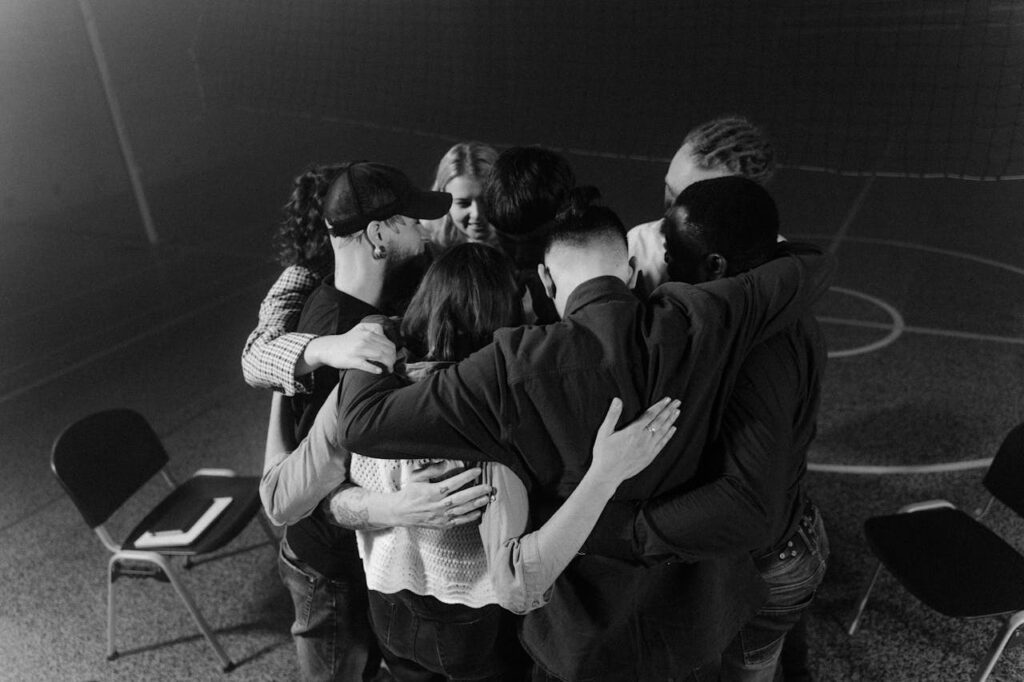What is Group Coaching? 
Group health and wellness coaching is a facilitated, synchronous process for small groups (fewer than 12 participants) led by a certified health coach. The aim is to leverage the collective experience and wisdom of the group to help each member achieve their health and wellness goals, while providing a supportive and stable environment.
Each participant receives equitable attention throughout the sessions. The coach, an expert in coaching and group dynamics with foundational health knowledge, focuses less on providing educational content (less than 20% of the time) and more on facilitating the group process. They do not offer significant support or therapy.
Sessions may include instruction in individual skills development, such as mind/body practices and journaling, and the use of self-assessment tools. Coaches equip participants with the skills to find their own answers. By modeling behaviors like encouragement, affirmation, focusing on positive progress, maintaining a nonjudgmental stance, building rapport, and reflective listening, coaches help group members learn these skills as well.
Coaches trust the group process and recognize that participants are their own best resource for experience and expertise. Groups can be tailored to specific audiences or be more general in focus, covering a wide range of health topics.
What Are Four Things Coaches Need to Consider Before Leading Group Coaching?
1. End-to-End Participant Experience
Creating a seamless end-to-end participant experience in group coaching is crucial for several reasons. A smooth experience keeps participants engaged and motivated throughout the coaching process. When participants feel that every aspect of the program is well-organized and cohesive, they are more likely to stay committed and actively participate. Consistent experiences across all touchpoints help build trust and reliability. A seamless experience leads to higher satisfaction levels. Satisfied participants are more likely to continue with the program, recommend it to others, and return for future sessions.
When the coaching process is well-structured, participants can focus more on learning and applying new skills rather than dealing with logistical issues. This enhances the overall effectiveness of the coaching. By focusing on creating a seamless end-to-end experience, health coaches can ensure that their participants receive the maximum benefit from the program, leading to better outcomes and a more positive coaching environment.
2. Administrative Burden (or lack thereof)
Health coaches may underestimate the amount of time that goes into facilitating group health coaching. This can be especially important when determining the price (and therefore hourly breakdown of pay) for the program. There is much more than just the time in the group container itself.
What health coaches need to consider is the time needed to prepare for each group session, to close out each group session (i.e. time for questions at the end, logging any data such as attendance), answering inbound messages from participants in between sessions, marketing the program, creating the curriculum, researching locations/technology, and possible discovery calls/meetings to see if the group is a good fit for the participant goals. Most of the time dedicated to group coaching occurs outside of the group container.
3. Health Outcomes vs Health Behaviors
The difference between health outcomes and health behaviors lies in their definitions and roles in health and wellness. Health outcomes refer to the results or consequences of health behaviors and other factors on an individual’s health. Health outcomes can include measures such as life expectancy, incidence of chronic diseases, mental health status, and overall well-being. Essentially, health outcomes are the end results that reflect the state of an individual’s health. Health behaviors refer to the actions individuals take that affect their health. These behaviors can be either health-promoting (e.g., regular exercise, healthy eating, not smoking) or health-deteriorating (e.g., smoking, excessive alcohol consumption, poor diet). Health behaviors are the choices and habits that influence one’s overall health. In summary, health behaviors are the actions taken to influence health, while health outcomes are the results of those actions and other contributing factors. Improving health behaviors can lead to better health outcomes.
While it is important to measure pre and post health outcomes to measure and display the effectiveness of a program, health behaviors can unfortunately be neglected in pre and post assessments. In conjunction with biometrics, it is highly recommended to distribute a pre and post lifestyle questionnaire as well. A lifestyle questionnaire can measure a participant’s health behaviors are various pillars of wellness. It is helpful to measure multiple pillars, not just the direct ones that are addressed in the program. For example, one may be working on sleep. As they improve their sleep, they may find organically that they have more energy and are exercising more too and not reaching for sugary snacks for an afternoon pick-me-up. There is a beautiful ripple effect that takes place when working on our health and wellness.
4. Engage Beyond the Group Container
We have heard “What happens in Vegas, stays in Vegas”. Many coaches may even say this as they set the rules of engagement for their group. But what if what happens in the group, doesn’t have to stay in the group container? Keeping all things confidential and HIPAA compliant, what if coaches increased reliability and accountability in between group coaching sessions? What if we created an opportunity for the participants to interact with each other outside of the group session?
These what if questions have profound positive answers. We would have more engagement, increased social support, and enhanced outcomes and behavior change. Finding a platform that enables a coach to send HIPAA compliant check-in texts and e-mails is vital. Finding one that also enables group challenge leaderboards, social handles, and the like help tickle various participant motivational preferences.

In Conclusion
Group health and wellness coaching involves a certified health coach facilitating small group sessions to help participants achieve their health goals by leveraging collective wisdom and focusing on skill development and group dynamics rather than providing direct education. Coaches need to home in on an engaging participant experience, how to decrease administrative burden, report on change in health outcomes and health behaviors, as well as provide opportunities for engagement outside of the group session. With these attributes as a foundation and a platform to enable these functions, coaches can build successful group coaching programs.
Author

Brittany Kowalski was one of the very first Nationally Board-Certified Health and Wellness Coaches in the country and earned her original certification through the University of Delaware’s Graduate program.
While sports medicine was her first passion, she became drawn to preventative approaches with her patients and threw herself into learning ways to help motivate people to manage and prevent chronic diseases. Her diverse experiences as a health promotion specialist including diabetes lifestyle coaching, mental health initiatives, and even laughter therapy programs, have allowed her to walk beside and help guide people on their wellness journeys.
Over her career, she has been sought out as an expert in the field of Health Coaching including speaking opportunities for the American Diabetes Association, the Medical Affairs Professionals Global Conference, Rutgers University, American College of Preventative Medicine, and the National Wellness Conference.In addition to her work as a clinician, she has also helped to initiate health coaching programs in various large-scale hospitals across the nation with focuses on cardiometabolic, pulmonary, bariatric, and physical therapy.


